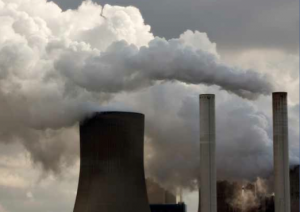Are We Soon to Be Up the Carbon Market Creek?
In his speech to the Democratic National Convention last week, President Obama promised that he would support a plan that, “will continue to reduce the carbon pollution that is heating our planet – because climate change is not a hoax.” While climate change is not a hoax, the most popular approach to climate change is little more than a shell game. Although market-based solutions to climate change, such as cap-and-trade, are touted as the future of greenhouse gas reduction, we know they hold little promise of actually reducing pollution. As California prepares to launch its cap-and-trade carbon market and the European Union and Australia plan to link their carbon markets to each other—a clear attempt at going global—a lot of countries are already buying into this market-based solution. But, is this a plan that actually reduces pollution, or is it merely big businesses trading credits for the opportunity to pollute?
By Mitch Jones and Rich Bindell
 In his speech to the Democratic National Convention last week, President Obama promised that he would support a plan that, “will continue to reduce the carbon pollution that is heating our planet – because climate change is not a hoax.” While climate change is not a hoax, the most popular approach to climate change is little more than a shell game. Although market-based solutions to climate change, such as cap-and-trade, are touted as the future of greenhouse gas reduction, we know they hold little promise of actually reducing pollution.
In his speech to the Democratic National Convention last week, President Obama promised that he would support a plan that, “will continue to reduce the carbon pollution that is heating our planet – because climate change is not a hoax.” While climate change is not a hoax, the most popular approach to climate change is little more than a shell game. Although market-based solutions to climate change, such as cap-and-trade, are touted as the future of greenhouse gas reduction, we know they hold little promise of actually reducing pollution.
As California prepares to launch its cap-and-trade carbon market and the European Union and Australia plan to link their carbon markets to each other—a clear attempt at going global—a lot of countries are already buying into this market-based solution. But, is this a plan that actually reduces pollution, or is it merely big businesses trading credits for the opportunity to pollute?
In California, their carbon trading plan is moving quickly, welcoming all types of businesses, not just energy plants and factory farms. But, in addition to the potential risk of price volatility and fraudulent credit exchanges, they are attempting to link carbon emission trading to other environmental issues, including forest offsets, with the California REDD (Reducing Emissions from Deforestation and Degradation) offset program.
REDD is another market-based approach to an environmental problem, in this case the effects of deforestation. But even the supporters of REDD programs have asked that they not become a factory for generating carbon offsets for cap-and-trade programs. To do so would undermine natural resources and the communities that depend upon them. In fact, Food & Water Watch wrote a letter to Governor Jerry Brown and California Air Resources Board Chairman Mary Nichols asking them to reject proposals to allow forest offsets in California’s carbon market.
The developments in California and the attempt to link markets between the EU and Australia are hefty first steps toward creating an international carbon market. Proponents, including Australia Minister for Climate Change and Energy Efficiency Greg Combet, believe that cap-and-trade systems are the “most efficient means” to solving climate change. But the philosophy behind them is based on the idea that companies have a “right” to pollute, and that they should be compensated when forgoing that “right.” Surely it would be more efficient to regulate pollution directly, instead of constructing a hodge-podge of markets and linking them in a de facto global market.
Cap-and-trade has a 25-year history here in the U.S., but it’s based on a false premise. As NASA scientist James Hansen said, it “perpetuates the exact pollution it is supposed to eliminate.”
Carbon reduction programs like these should not be a substitute for regulation. They are difficult to implement, create unneeded problems with unfair credit distribution, and threaten the stability of the marketplace. Above all, they benefit current polluters at the expense of everyone else. It’s merely a substitution of economic abstractions in place of actual regulation.


